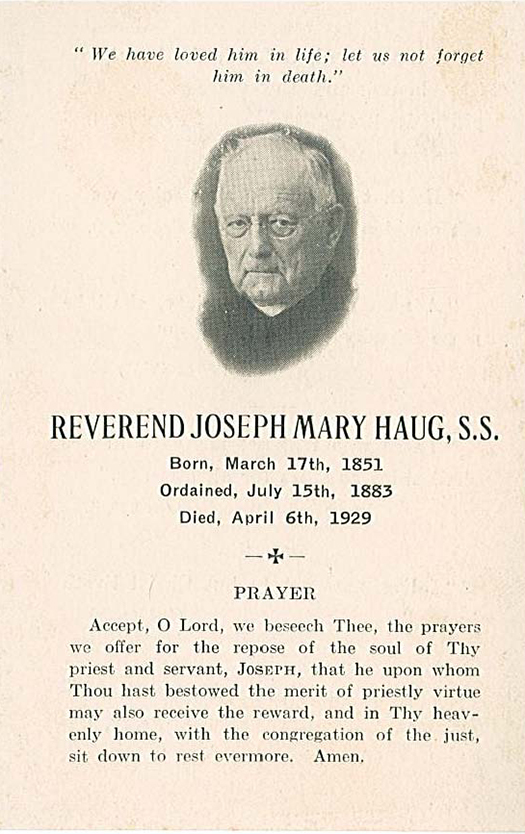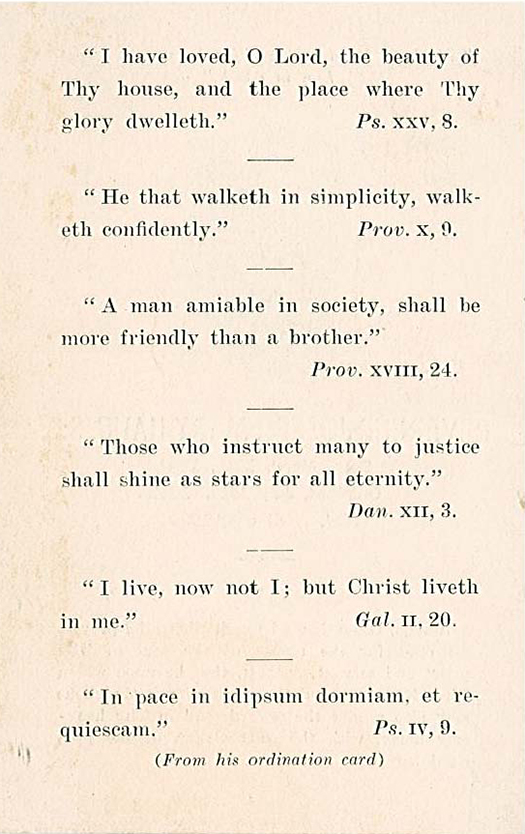Haug, Father Joseph
1929, April 6
Date of Birth: 1851, March 17
Issy
April 23, 1930
Fathers and Dear Confreres:
More than a year ago in Baltimore there died one of the best-known American confreres, Father Haug, bursar of the minor seminary of St. Charles.
Joseph Mary Haug was German by origin. Born at Bisingen in the Principality of Hohenzollern on March 17, 1851, St. Patrick’s Day, and baptized two days later on the Feast of St. Joseph, our future confrere belonged by birth to the Diocese of Fribourg in Brisgau. His family, deeply Catholic, watched carefully over his education and exercised over him a direct and profound influence up to his eighteenth year.
It might be said that starting from that period of his life, Joseph Haug was completely free from family control. For if he left Germany before his nineteenth year and if he reached the United States, it was to rejoin one of his sisters, Mary Haug, who had been living in New York for several years. She influenced her brother to come to America, holding out to him the shining hope of an easy and profitable career.
In the United States, Joseph Haug found at once what he came seeking – an honest well-paying trade in which he would doubtless have succeeded if Providence had left him in it. With one of his friends, desirous like him of finding the Golden Fleece, he went to set himself up in New England. And there, for more than four years, he worked with success in a locksmith’s shop. But while his friend – like himself successful – settled into the profession of his choice, Joseph Haug heard God speaking in his heart. The voice of grace was stronger than the voice of worldly prospects. On August 30, 1873, at the age of twenty-two, our future confrere was enrolled in the minor seminary of St. Charles at Ellicott City, Maryland, to begin his preparation for priesthood. He entered there at the beginning of September.
His first Latin teacher and his director was our venerable confrere, Father Schrantz, who outlived his student and his spiritual son, and who is inconsolable over his death. With Father Schrantz, Fathers Guilbaud, Menu, Denis, Vuibert all contributed, each in his own way, to Joseph Haug’s continuing formation. He made remarkable progress at St. Charles. He very quickly took an honorable rank, successfully finished his studies in 1878, and found himself ready to enter St. Mary’s Seminary in Baltimore.
Father Haug stayed there only one year, 1878-1879, to complete his Philosophy.
In the following year, interrupting his regular course of study, Father Haug agreed, at the request of his former teachers, to become their auxiliary at the minor seminary of St. Charles, which he had left the year previous.
His stay at St. Charles as teacher was not long. At the opening of the following school year, in October 1880, he was at St. Sulpice in Paris. It was there that he finished his formation for priesthood and was the student of Fathers Baquez, Brugere, Hogue. He kept a very fond memory of them. Before coming to St. Sulpice, Father Haug had received tonsure and was incardinated into Baltimore. Paris was where he received all the other orders, save priesthood. That ordination was conferred on him at Metz on July 15, 1883, by reason, no doubt, of his nationality (for that diocese had been annexed by Germany) and to avoid complications whenever he might desire to return to his native land. He had that joy in the vacation period of 1884. His Solitude finished, Father Haug, before leaving Europe, spent some weeks at Bisingen. There was great merrymaking in that very Catholic small town on the day that Joseph Haug sang his first Solemn Mass. He had not gone back to Germany since 1869, the time of his leaving for America. Later on, he several times had the happiness of seeing again his “little fatherland,” and we remember the time in these last years when, on his way through France, we had the joy of showing him the hospitality of Paris and Issy.
In 1884 he returned to the United States. His first school year there, Fr. Haug taught Philosophy at St. Mary’s Seminary in Baltimore. It was, we think, his only year of service in the major seminary. At the opening of school in 1885, he was appointed to teach at the minor seminary of St. Charles in Ellicott City. And there, for nearly forty-five years, he devoted himself completely to the formation of young men who were contemplating priesthood.
Teacher of second- and fourth-year high Latin, he added to his main teaching tasks Greek, French, and Mathematics, and, also for long years, History. In this last assignment especially, he excelled, not only in instructing students, but also in giving them a religious and Catholic outlook. All remember with edification the filial respect which breathed in his voice when he spoke of “Our Holy Mother, the Church.”
The two characteristics of his life were amiability and joy. He made it a good thing to be his student or to work with him. He had no difficulty in winning the esteem and affection of boys and young men through his simplicity and good humor. As for his confreres, he was for them a man of perfect charity no matter what was their age, their temperament, or their nationality. He was charitable to such a degree that in the course of the Great War he knew how to blend love of his distant country with the most delicate respect for the patriotism of others. It has been written of him Charitas patiens est … non queerit quae sua sunt … omnia suffer, omnis credit, omnia sperat, omnia sustinet [Charity is patient … does not seek its own … suffers all things, believes all things, hopes all things, bears all things.]
Father Haug, in his deep piety and his intimate union with God, was saturated with the virtue of charity.
Behold him at the altar, celebrating the Holy Sacrifice! His attention, his respect, his love of Our Lord appeared so clearly that the youngest boys at St. Charles were touched by it and deeply impressed. His great devotion to the Eucharist induced him to be slow so that he could enjoy its graces longer. That same devotion induced him to make in the course of the day frequent visits to the Blessed Sacrament. His good soul loved, if we may say so, to use the Eucharist to pay his debts to those known to be owed something. The delicacy of this sentiment stood out especially in his feelings about the benefactors of St. Charles. Both on the occasion of the 1911 fire and later, when the college was being rebuilt at Catonsville, he loved to pray each day and frequently to celebrate Mass, “so that,” he said, “God might deign to pay back our benefactors as He alone would know how to pay them back.”
On October 17, 1928, some time before his death, he received for the first time the last sacraments. After receiving them, he let slip some secrets. This one in particular: “Some years before, in the course of a retreat, God had given him the grace,” he said, “of having henceforth an intimate union with Our Lord.” He regarded that grace as a special privilege received from the hands of God. And with him, the grace showed itself in the frequent remembering of sacred texts which best express the union of souls with Jesus Christ. “It is no longer I who live but Christ lives in me. … My life is Jesus Christ … As the Father has sent me, and as I live by the Father, so he who eats me will himself live by Me.”
The union of his soul with Our Lord showed itself in Father Haug by his total abandonment to the Divine Will. “I have no choice,” he said, “in the very circumstances which we face right now. I shall be happy to return to St. Charles where my confreres have been so good for me, but I will be just as happy to die if such is the good pleasure of God.” And at work, and in truth, I find it quite easy.”
Father Haug’s illness, which lasted from October 2, 1928, at first did not seem incurable. But in March 1929, it became worse to the extent that death seemed unavoidable. The patient, who had already received the last sacraments the preceding October, received them again, fully conscious when – some days before his death – it was suggested to him. After that, little by little, he lost consciousness. On Saturday, April 6th, at five o’clock in the morning, in the presence of Father Brown, Vice-president of St. Charles, and two Bon Secours Sisters, Father Haug sweetly went to sleep in the peace of the Lord.
His funeral was celebrated in the chapel of St. Charles, where he had for so long celebrated the Holy Sacrifice. It was conducted by Father Fenlon, Provincial of St. Sulpice, who sang the Mass. Following custom, the eulogy was preached by Monsignor C. F. Thomas, Protonotary Apostolic, last living classmate of Father Haug, who wanted to give to the revered deceased this last homage of his friendship.
So died this priest who did so much good, and about whom his old director, Father Schrantz, wrote to Father Haug’s sister: “We are proud of him, and honor him in your family as a saint.”
Please accept, Fathers and dear confreres, the expression of my respectful and very devoted affection in Our Lord.
P. Boisard
Vice Superior of St. Sulpice


